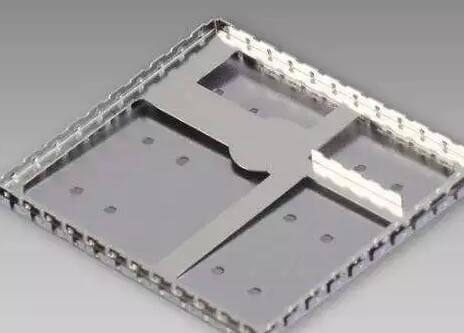- 0531-87887788

來源:http://www.yelang007.com/ 發(fā)布時間:2019-06-04
比較了鋁板、鋼板和銅板的屏蔽性能
The shielding performance of aluminium plate, steel plate and copper plate were compared.
1. 鋁板通常屏蔽何種范圍的電磁波?
1. What range of electromagnetic waves are usually shielded by aluminium plates?
2. 使用鋁板作為主要電氣元件的安裝板有什么特別的好處,例如在電氣柜中的過濾器?
2. What are the special advantages of using aluminium plates as mounting plates for major electrical components, such as filters in electrical cabinets?
3.我們知道鋁的滲透率很低。如果一個空間是用鋁蓋密封的,沒有泄漏,那么外磁場的磁力線不會通過這個封閉的空間嗎?
3. We know that aluminium permeability is very low. If a space is sealed with an aluminium cover and there is no leakage, will the magnetic lines of the external magnetic field not pass through the enclosed space?
1. 一個:
1. First:
(1)對于電壓高、電流小的干擾源,近場以電場為主,其磁場分量可以忽略;(2)對于低壓、大電流干擾源,近場以磁場為主,其電場分量可以忽略;(3)對于較高的頻率,或者在遠離干擾源的地方(遠場條件),無論干擾源本身的特性如何,都可以看作是平面電磁場。此時,電場和磁場不可忽略。對于鋁板,電場波在整個頻率范圍內的屏蔽效率都非常好。平面波的屏蔽效率在整個頻段也是可以接受的(0.5mm鋁板的屏蔽效率在整個頻段至少大于120dB);對于磁場波屏蔽,低頻(小于100KHz)的屏蔽效率較差,當大于1MHz時屏蔽效率顯著提高。
(1) For high voltage and low current sources, the electric field is dominant in the near field, and the magnetic field component can be neglected; (2) for low voltage and high current sources, the magnetic field is dominant in the near field, and the electric field component can be neglected; (3) for high frequency or far field conditions, regardless of the characteristics of the source itself, such as the far field condition. Anyway, it can be regarded as plane electromagnetic field. At this time, the electric and magnetic fields can not be neglected. For aluminium plate, the shielding efficiency of electric field wave in the whole frequency range is very good. The shielding efficiency of plane wave is acceptable in the whole frequency band (the shielding efficiency of 0.5 mm aluminum plate is at least more than 120 dB in the whole frequency band); for magnetic field wave shielding, the shielding efficiency of low frequency (less than 100 KHz) is poor, and when it is greater than 1 MHz, the shielding efficiency is significantly improved.
2. 鋁板或銅板主要用于屏蔽100KHz以上的電磁波。至于特別福利,(在我看來)可能還有其他考慮。
2. Aluminum or copper plates are mainly used to shield electromagnetic waves above 100KHz. As for special benefits, there may be other considerations.
3.鋁板或銅板的滲透性很低。如果空間被鋁屏蔽,由于其低滲透性,幾乎沒有旁路功能。為了獲得更好的屏蔽效率的封閉空間,需要使用高導磁率的鋼板進行級進屏蔽。這樣,當外磁場通過空間時,大部分磁場被高磁導率的鋼板(旁路)所轉移,從而使空間更干凈。

3. The permeability of aluminium or copper sheets is very low. If the space is shielded by aluminium, it has almost no bypass function because of its low permeability. In order to obtain a better shielding efficiency of the enclosed space, it is necessary to use high permeability steel plate for progressive shielding. In this way, when the external magnetic field passes through the space, most of the magnetic field is transferred by high permeability steel plate (bypass), which makes the space cleaner.
4. 鋁板制成的屏蔽屏蔽磁場的影響不如鋼板,因為鋁滲透率不如鋼鐵和其他鐵磁材料,但有些場合聽說鋁板可以磁絕緣,主要指的是鋁板哪方面的特點?我還想問一下,由于鋁的滲透性較低,磁場線是否可以通過鋁板。
4. The influence of shielding magnetic field made of aluminium sheet is not as good as that of steel sheet, because aluminium permeability is not as good as that of steel and other ferromagnetic materials. But in some occasions, it has been heard that aluminium sheet can be magnetically insulated, mainly referring to the characteristics of aluminium sheet. I also want to ask, because of the low permeability of aluminium, whether magnetic field wire can pass through aluminium sheet.
一個問題:“某些場合”是什么意思?在許多情況下,不可能區(qū)分磁分量是大還是無線電分量是主要分量。這就是上面的情況(3)。對于這種情況,我可以使它簡單(容易理解)。事實上,材料對電磁波的屏蔽效率不僅取決于材料的滲透性,而且還影響到平面波的屏蔽效率。
The first question is: What does "in some cases" mean? In many cases, it is impossible to distinguish whether the magnetic component is large or the radio component is the main component. This is the case above (3). In this case, I can make it simple (easy to understand). In fact, the shielding efficiency of materials to electromagnetic waves depends not only on the permeability of materials, but also on the shielding efficiency of plane waves.
總之,影響屏蔽效率的因素有三個。(2)平面電磁波的磁導率(3)頻率;鋁或銅的導電性雖小,但比鋼板的導電性大。a.對于低頻電磁波,鋼板對平面波有很好的屏蔽作用(鋼板的蒙皮深度小于鋁(銅))。B.對于頻率大于0.01MHz的平面波,鋁或銅具有良好的屏蔽效果。而且很多場合的電磁波頻率都大于這個頻率范圍,所以,很多場合都會聽到鋁板的屏蔽效果很好。其實,誰優(yōu)誰劣,基本上看你要屏蔽的電磁波得到的頻率基本上是哪個波段。好吧?不同的材料有不同的電磁波頻率。
In short, there are three factors affecting shielding efficiency. (2) Permeability of plane electromagnetic wave (3) frequency; conductivity of aluminium or copper is small, but larger than that of steel plate. A. For low frequency electromagnetic wave, steel plate has a good shielding effect on plane wave (the skin depth of steel plate is less than that of aluminum (copper). B. For plane waves with frequencies greater than 0.01MHz, aluminum or copper have good shielding effect. Moreover, in many cases, the frequency of electromagnetic wave is larger than this frequency range, so the shielding effect of aluminium plate is very good in many cases. In fact, who is better or worse depends basically on the frequency band of the electromagnetic wave you want to shield. Okay? Different materials have different frequencies of electromagnetic waves.
第二個問題:鋁板滲透性低,通過鋁板的磁場線很少。你想啊,磁導率,顧名思義,是磁導率的大小,鋁板滲透率很低,當然,窮人的磁導率,很多磁力線通過鋁板,直接影響鋁封閉的內部空間,影響鋁蓋的內部空間,以免打磁屏蔽的影響。然而,如果這是一個鋼板,磁力線接觸鋼板時,大部分的磁力線將被鋼板由于鋼板的強磁導率,以免影響鋼板的內部空間通過鋼板,達到屏蔽的效果。注:以上分析僅考慮滲透率。換句話說,對于以電磁波為主的低頻情況。
Second problem: Aluminum plate has low permeability and few magnetic field lines passing through it. You think, permeability, as the name implies, is the size of the permeability, the permeability of aluminium plate is very low, of course, the permeability of the poor, many magnetic lines through the aluminium plate, directly affect the closed internal space of aluminium, affect the internal space of the aluminium cover, in order to avoid the impact of magnetic shielding. However, if this is a steel plate, when the magnetic line contacts the steel plate, most of the magnetic line will be due to the high permeability of the steel plate, so as not to affect the internal space of the steel plate through the steel plate, to achieve shielding effect. Note: The above analysis only considers permeability. In other words, in the case of low frequencies dominated by electromagnetic waves.